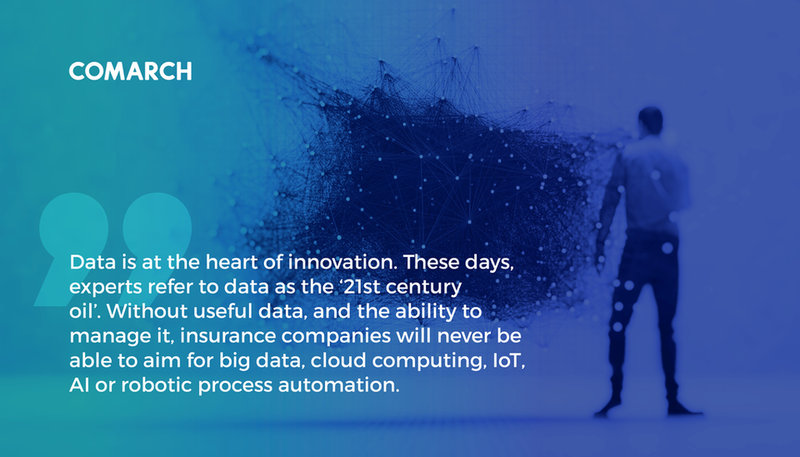Data is at the heart of innovation. These days, experts refer to data as the "21st century oil". Without useful data, and the ability to manage it, insurance companies will never be able to aim for big data, cloud computing, IoT, AI or robotic process automation. Especially now, in the face of the pandemic and accelerated digitization, the time has come to fully understand and draw upon these trends.
According to IBM, 2.5 billion gigabytes of data are generated every day in the world, and 90 percent of them have been generated in the last two years alone. In such a fast-paced world, the insurance industry has a reputation for being slow and resistant to change.
The main areas where insurers are innovating are customer service or claims handling. The problem with data, that usually becomes apparent here, is that much of it is migrated from outdated IT systems. Many insurers claim that legacy systems are one of the main barriers to digitization.
Data acquisition channels make things ever harder too. Data is still collected through paper documentation, scans or emails. Insurance agents sometimes store data in their own resources, sharing it with the company only to the minimum extent required. Insurers are therefore exposed to the risk of moving around in an area of incomplete and unstructured information.
To remedy this, insurers must begin to implement solutions that ensure access to the widest possible data resources in the shortest possible time. This is where AI and machine learning algorithms, used today from voice assistants to autonomous vehicle software, come into play. For many insurers, it is still a problem to collect and prepare the right set of data to support these algorithms.
One effective solution to these problems is the example of Amazon. As far back as in 2002, Jeff Bezos, Amazon’s CEO, issued the company guidelines for data management (Bezos Mandate). All teams have been ordered to disclose data and communicate through service interfaces. No other form of inter-process communication was allowed. Bezos also ordered that all service interfaces should be designed to be accessible to external users. With no exceptions.
As experts indicate, AI in the insurance industry will become absolutely essential. According to Gartner, over the past four years, companies' confidence in AI-based solutions has increased by 270 percent. Almost 40 percent of companies worldwide have already implemented AI technologies. Insurers are slowly beginning to see this. They're already automating less complex operations, looking to machine learning, chat bots, and implementing omni-channel digital platforms. AI helps segment and stratify risks, enabling better portfolio management.

It is estimated that by 2030, 90% of motor insurance claims will be handled automatically, using AI tools only. Most importantly, efficient analysis of data sets, using AI technology, reduces risk. The better we manage our input data sets, the better quality of data we get at the output. And this is the primary goal of every insurer.
McKinsey Global Institute indicates that AI technology adaptation rate for the financial industry is 28% and is one of the highest in the economy. It predicts that it is precisely in the case of banks and insurers that AI expenditures should grow fastest.
The pace of digitization and automation is further boosted today by COVID-19. According to Global Capital Confidence Barometer of EY, every third company will boost the digitalization process. For 36% of managers from 45 countries, intensive automation is a priority and they indicate it as the best anti-crisis shield. Digitalization and the ability to use the latest technologies should be the key factors motivating insurers to maximize the quality of collected and owned data.
Machine learning platforms are designed to be more effective as data flows in. AI is a telescope that allows you to see what is important in the inflow and focus on solving quantitative problems making complex data sets more useful. And from there, it's only a step towards full process automation and robotization.
Robotization is one of the fastest growing segments of the software market. According to Gartner, in 2021, more than 50% of companies will spend more on robots than on traditional mobile applications per year. Entering such a future requires insurers to move away from precise system programming in favor of constantly learning AI algorithms. All based on the analysis of useful data sets.
Author:
Aleksandra Wołowska
Business Consultant, Comarch
Learn more about Comarch insurance software
Aleksandra Wołowska - business consultant with twenty years of experience in sales, consulting service and program management for banks and life and non-life insurers: ALLIANZ Group, ERGO Group, VIG Group or GE Money Group. Experienced with international projects and product delivery as well as insurance process management, demand, sales and bancassurance. Created product sales strategy, consulting and business analysis service for Polish and international market. Agile expert with passion for continuous improvement.